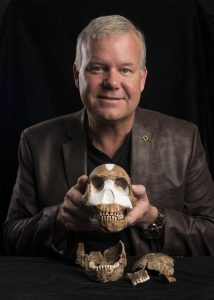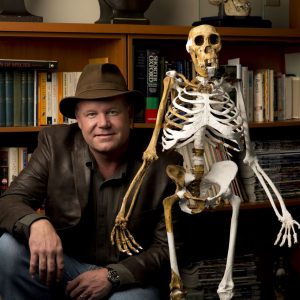
World-renowned paleoanthropologist Dr. Lee Berger will speak on his leading-edge discoveries in South Africa in his lecture “Homo naledi – The Species Rewriting the Story of Us” on Monday, Oct. 2 at 7:30 p.m. in the Biology Building Auditorium. The lecture, presented by University Museums, is free, but seating is limited.
Berger was named one of Time magazine’s 100 Most Influential People in the World in 2016 for his discovery of ancient Homo naledi remains in the Rising Star cave system near Johannesburg, South Africa.
The fossils are dated to sometime between 335,000 and 226,000 years ago. According to Berger, the discovery has affected human origins studies in the same manner that King Tut’s tomb affected the study of Egyptology.
“Homo naledi is shedding light on the origins of our species,” Berger said. “But as it is so unexpected in its morphology and anatomy, it challenges us to reconsider what we thought was a simple story of how we as a species came to be.”
Berger’s lecture will take the audience through his discovery, explaining the history and importance behind every action taken by Berger and his team of “underground astronauts,” the six female scientists and explorers who risked their lives to help Berger retrieve the fossil from the Rising Star cave system.
Before the discovery of Homo naledi, Berger was most famous for his discovery of Australopithecus sediba, an early human relative.

Berger, a National Geographic Explorer-in-Residence, is known for applying modern technology to techniques used by anthropologists for decades, especially in underwater excavations. He is also an internationally recognized advocate of open access science.
Berger is currently the Research Professor in Human Evolution and the Public Understanding of Science and the division director of paleoanthropology in the Evolutionary Studies Institute at the University of the Witwatersrand in Johannesburg.
In addition, Berger is a Fellow of the Royal Society of South Africa and the South African Academy of Sciences, as well the recipient of the National Geographic Society’s first Prize for Research and Exploration. An avid writer, he has written more than 200 scholarly papers and has been featured in Time, Scientific American and Discover magazines on multiple occasions.
